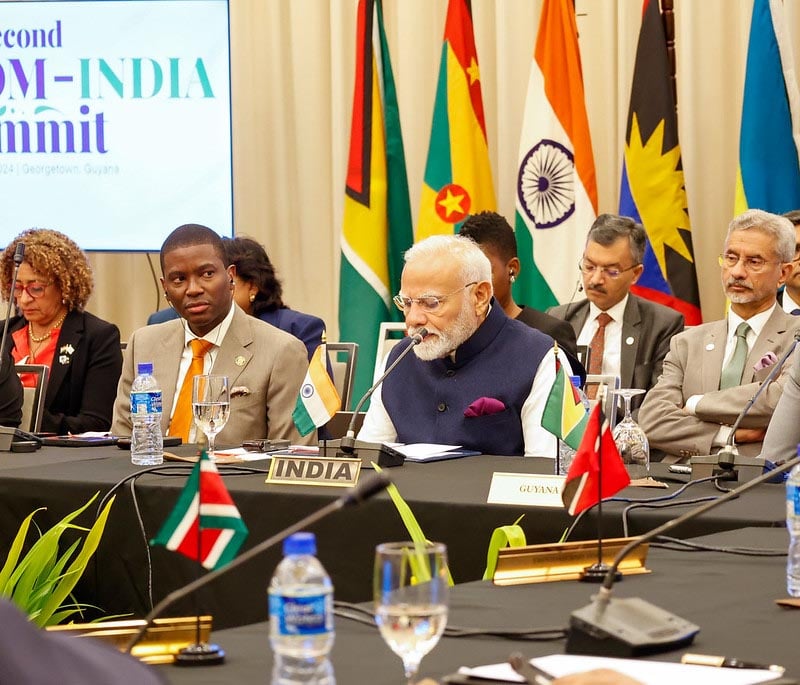Indian Prime Minister Narendra Modi yesterday proposed 1,000 more scholarships for CARICOM nationals over the next five years, help with mobile hospitals and the promoting of millets as a superfood in a wide-ranging address that also encompassed training for women cricketers.
Unveiling a strategic framework centred around the acronym CARICOM at yesterday’s second summit between India and the Caribbean Community, he outlined seven pillars designed to advance cooperation.
Speaking at the Marriott Hotel, the Prime Minister emphasized New Delhi’s commitment to supporting the development of human capital in CARICOM nations.
Modi, who arrived here on Wednesday night from Brazil, said India is pro-posing an additional 1,000 scholarships over the next five years. Furthermore, India aims to establish a Technical Development Centre in Belize, expanding its scope to benefit all CARICOM countries. The centre will focus on enhancing technical training for youth across the region, while an online portal for forensic education, technology, administration, law, and education will be launched to facilitate remote learning. India is also eager to collaborate on training programmes for parliamentarians across the Caribbean.
Speaking in Hindi which was then translated, he said that India’s advancements in agriculture, including the use of drones, digital farming, and soil testing, have positioned the country as a leader in agricultural innovation. Prime Minister Modi outlined India’s commitment to addressing food security in the region by promoting millets as a climate-resilient superfood. On August 5th last year, Guyana received a quantity of millet seeds from the Indian Government for trials. Then Indian High Commissioner to Guyana, Dr K J Srinivasa handed over the seeds to Agricul-ture Minister, Zulfikar Mustapha.
Additionally, Modi said that India has developed a fertilizer from sargassum seaweed, a pervasive issue affecting the Caribbean’s hotel industry. This innovative solution could improve crop yields while addressing environmental challenges.
Noting that health security remains a priority for CARICOM nations, particularly non-communicable diseases such as cancer, Modi proposed assisting with the establishment of mobile hospitals in the region, offering remote health services and trauma care. India’s expertise in drug testing and cancer treatment, along with its Yoga for Wellness programmes will also be shared to promote preventive healthcare and lifestyle disease management across the Caribbean.
Addressing the urgent challenges of climate change, the PM invited CARICOM countries to join the International Solar Alliance and the Global Biofuel Alliance, initiatives aimed at enhancing global cooperation on renewable energy. India is making significant investments in solar energy, and Modi proposed installing solar-powered government buildings across CARICOM nations as a demonstration of India’s commitment to climate action.
Cricket, a sport that binds India and the Carib-bean, was also a focus of the summit. Modi proposed a training program-me for 11 women cricketers from each CARICOM country, fostering greater ties between India and the Caribbean while empowering women through sports. India also plans to organize cultural exchanges, including film festivals and heritage events, to promote greater cultural understanding and collaboration between the two regions.
And with many CARICOM nations being large oceanic states, Modi emphasized the importance of maritime cooperation. He proposed enhancing connectivity through cargo and maritime mapping and hydrography, offering India’s expertise to support the region’s maritime security strategy. This collaboration could help tackle issues like drug trafficking, piracy, and human trafficking, while unlocking the untapped potential of the ocean economy.
Noting that India has emerged as a global hub for technology and startups, with infrastructure capable of supporting a wide range of digital services, Modi suggested that India’s Unified Payments Interface (UPI) technology, which facilitates seamless digital payments, could be adopted by CARICOM nations to benefit the region’s population. Addi-tionally, India is ready to share its expertise in public procurement through a digital portal, which facilitates the online purchase of medical equipment, furniture, and other supplies.
The Indian PM express-ed optimism about the future of CARICOM-India relations in his remarks to the Heads of Government gathered, highlighting the progress made on initiatives identified during the first meeting.
In his closing remarks, Modi reaffirmed that India’s cooperation with CARICM is guided by the core principles of mutual respect and shared priorities. He expressed confidence that the summit would further strengthen the enduring partnership between India and the Caribbean.
Yesterday’s summit follows the inaugural meeting held in September 2019, during the 74th Session of the United Nations General Assembly.
CARICOM Chair, Grenadian Prime Minister Dickon Mitchell, Guyana’s President Irfaan Ali and CARICOM Secretary General Carla Barnett also spoke at yesterday’s summit.





